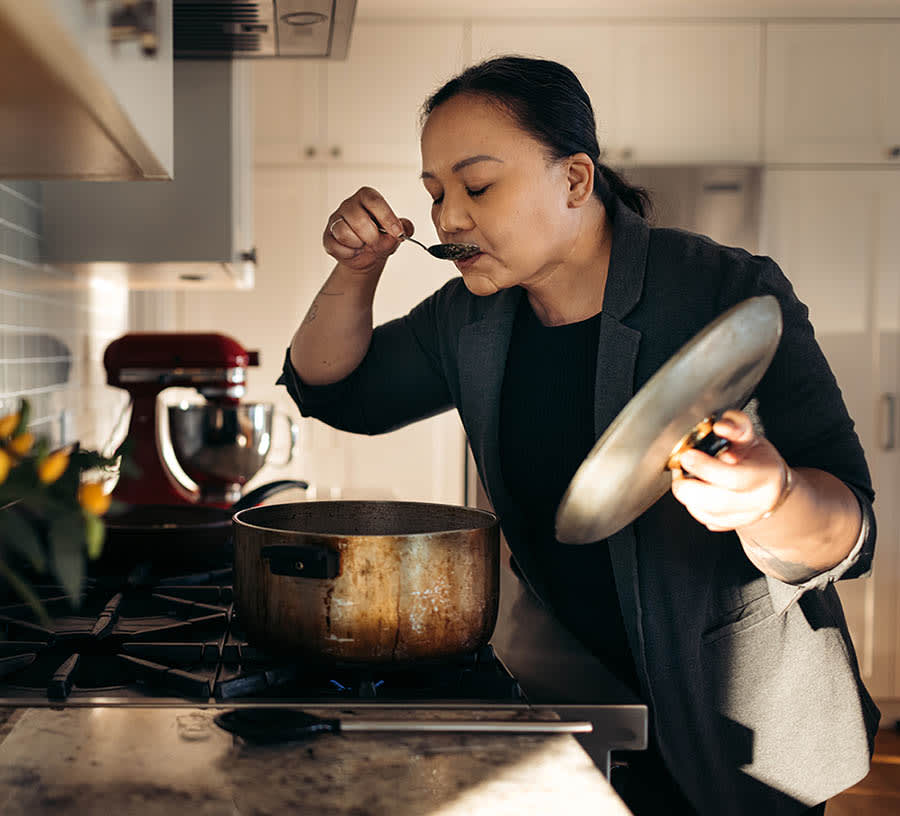Accelerating Access — and Early Detection — for Oral Cancer Patients in the Fraser Valley
November 30, 2023
Found in BC Oral Cancer Prevention Program, Oral Cancer

Few would consider accidentally biting their tongue lucky. But for Rosalyn Salanguit, the minor but annoying injury saved her life.
The wound, suffered in the spring of 2015 while Rosalyn was eating lunch, refused to heal for months. After unsuccessfully treating it with painkillers, Rosalyn visited her dentist in October. He took one look and immediately sent her to pathology, where she was diagnosed with Stage 2 tongue cancer.
By the time Rosalyn had surgery two months later, the disease had advanced to Stage 4 and required the removal of half her tongue, a graft (using tissue and an artery from her forearm) and a neck dissection to extract 47 lymph nodes to which the cancer had spread. Chemotherapy and radiation followed. As did another surgery to remove two teeth to save her jaw.
“My doctors warned I might not speak or eat without a feeding tube again,” says Rosalyn. Eight years later, she’s doing both (just not at the same time) thanks to her team at BC Cancer – Vancouver.
“I was fortunate to access oral cancer care close to home, supported by my family and friends,” she says. But for 40% of the patients currently seen at BC Cancer – Surrey, for whom it’s necessary to travel long distances from other areas in the Fraser Valley, this is not yet the case.
However, thanks to the generosity of BC Cancer Foundation donors, a new Oral Oncology and Dentistry Clinic at BC Cancer – Abbotsford is near completion. The state-of-the-art two chair clinic will be the only one in the province with direct access to an operating room for complex reconstructive surgical procedures.
The final step is to equip the clinic with a critical piece of equipment — a Cone Beam CT (CBCT), essential for reconstructive procedures, surgical planning, and advancing early detection.
Oral cancer survival rates drop from 80% to 20% in late-stage diagnoses, which can also result in significant disfiguration that takes a tremendous psychological toll on patients’ quality of life, says Dr. Suzanne Carlisle, BC Cancer department head, Oral Oncology/Dentistry Surrey.
“I see heartbreaking cases — people with facial deformities and people who haven’t been able to eat solid food for years. We need to address their oral health needs so they can eat, smile and be healthy again.”
In addition to assisting in early detection and recurrences by enabling the most accurate tracking of changes to a person’s cancer, a CBCT aids in treatment planning, diagnosis and managing cancer-specific infections. It also helps to expedite care and reduce the number of offsite referrals (decreasing waitlists and patient anxiety associated with waiting for an appointment or diagnosis) by affording clinicians quick and easy access to images without the extra step of coordinating with external clinics.
“With a CBCT on site, we can interpret results within seconds and, if needed, immediately send patients to specialists for subsequent treatment. Imaging from CBCT will allow us to plan three-dimensional designs of surgical care for procedures performed in Abbotsford’s operating room,” says Dr. Carlisle.
Oral cancer rates typically increase with age, tobacco and alcohol use. However, the disease is becoming more common in young people like Rosalyn, who was just 35 when she was diagnosed. It’s also more prevalent in South Asian, Chinese and First Nations populations. In the South Asian community one in 150 people (compared to one in 800 in the general population) are at higher risk. With South Asians representing 10% of B.C.’s population, many of whom call the Fraser Valley home, bolstering oral cancer care at BC Cancer – Abbotsford is crucial to improving cancer outcomes in the community.
To help bring this state-of-the-art Oral Oncology and Dentistry Clinic to Abbotsford, please contact Scott MacDonald at 604.851.4736 or scott.macdonald@bccancer.bc.ca.